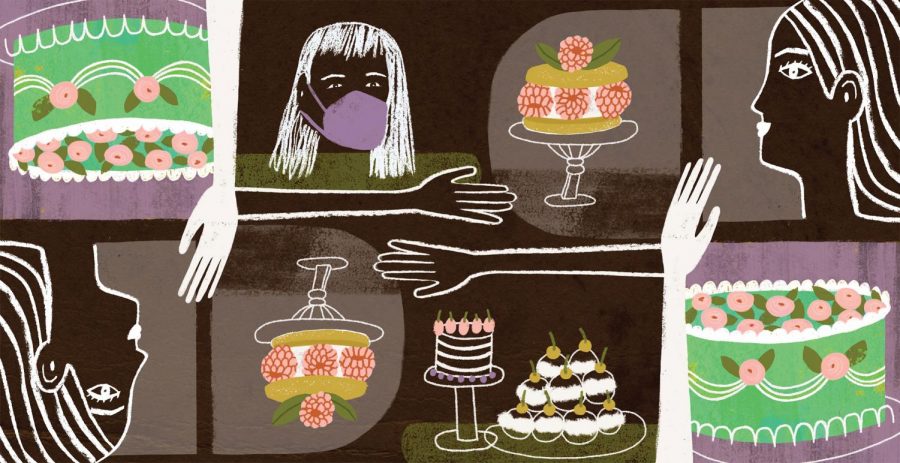Baking: the Viral Activity of the Pandemic
Baking has always been one of my favorite hobbies, but I rarely have enough time for the lengthy process that it entails. However, at the end of March, I suddenly gained hours upon hours of free time needing to be filled as a result of school shutting down and sports getting canceled. What better way to pass the time than baking?
It seems that the rest of the country had the same idea as my family did, as demand suddenly skyrocketed for baking ingredients and the supply quickly ran out. According to The Atlantic, industry-wide flour demand increased by 160%, and the milling industry wasn’t set up to handle this new nation-wide passion for the culinary arts. Before the pandemic, the need for flour was constant and steady, and while wheat has been abundant throughout the pandemic, milling companies took a long time to scale up their production for the increased demand. Culinary arts therapist (culinary arts therapy “uses arts, cooking, gastronomy, and an individual’s personal, cultural, and familial relationship with food to address emotional and psychological problems”) Julie Ohana explains, “Cooking and baking bring comfort…the process helps aid the baker and the finished product helps comfort the person or people receiving it.” And yes, I didn’t know that baking therapy was a thing either before writing this, but I have definitely felt baking to be therapeutic. As an amateur baker, my baking experience during the pandemic has certainly looked different from that of more serious bakers.
An important aspect of baking for me is to find a connection to other cultures, including my Finnish ancestry. Using recipes passed down from my Finnish grandma, I’ve made sweet cardamom buns, plum pinwheel pastries, oven-baked pancakes, and others. Especially after moving back to the US from Finland, Finnish baked goods have made me feel connected to the country despite living far away. While I do love brownies and chocolate chip cookies, I like to bake unique things that I wouldn’t be able to get from an American store.
In the spring, the main reason I baked was to pass time, but since I started at Lakeside in the fall, baking has become a way for me to focus and distract myself from rigorous and demanding schoolwork. While this does mean that baking occasionally becomes a way to procrastinate, parts of baking (like kneading bread) have been an important stress-reliever for me. Central to my love of baking is making food for other people. During the pandemic, that’s become harder to do as parties and events haven’t been happening, so I’ve baked desserts to bring to outdoor dinners, as well as been a participant and a judge in baking competitions involving my brother, myself, and our COVID pod-mates. For me, my baking has really only been positively affected by the pandemic, but for people who cook and bake more seriously than I do, it’s had a much more far-reaching impact.
Sadie D-S. ’24 writes weekly recipe articles for the Seattle Times and in her family, cooking is a form of communication. “If something bad happens, you cook dinner for someone, or if something needs to be celebrated, you celebrate by making cookies or cake!” During the pandemic, she’s started giving partly-baked meals to friends and neighbors for them to finish and eat later. Although she misses the smiles that people give when she puts a hot plate of food in front of them, she says that she’s taken the pandemic as an opportunity to refine some of her cooking skills. She’s also worked on becoming a part of the greater Seattle chef scene and helping local restaurants impacted by COVID by partnering with them to make promo videos for their products and creating ideas for to-go boxes and pre-made food.
I also corresponded with my family friend Alex Raij, a restaurateur in New York City who has had to close all of her four restaurants during the city’s lockdowns. About the effect of COVID for her community, she said, “We’ve changed up our charitable contributions to be more inclusive and more local and…despite closures we have been able to provide 28 well-paid (by industry standards), safe-as-possible, distanced jobs and that has been very gratifying and humbling.” Alex has taken the pandemic as an opportunity to make the cooking at her restaurants more intimate, give the cooks more independence, and do some things that wouldn’t be possible normally. For example, one of her restaurants has served 40,000 relief meals since April! She says that having had time off has re-energized her and her staff and given them more appreciation for cooking. At home, Alex has been able to cook more for her family than she did while working full-time at her restaurants, adding, “It’s the home cooks that often breed the professional chefs, I think.” As for advice for people interested in cooking, she says, “Allow literature, poetry, and science to have impact and form in your cooking…Read stuff ‘not’ connected to cooking!… Those things can add so much to your own culinary footprint.”
The pandemic has changed some of the most fundamental aspects of baking in both positive and negative ways. Millions of people now have the free time to try baking for the first time, but simultaneously bakeries and restaurants are reeling from the effects of lockdowns and decreased demand. Sharing food with family, friends, or neighbors safely is a great way to grow relationships, and supporting local bakeries and restaurants is extremely important now during the period of reduced patronage. Food is just as much about eating as it is about community.
Review: Zane: The Movie (★★★★☆)
Released in early 2006, Zane quickly became a fan favorite. A charming and lovable fella, Zane has captured...

